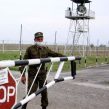
Kazakhstan to Adopt a New Law on State Borders after Border Guard Slaying
Publication: Eurasia Daily Monitor Volume: 9 Issue: 122
By:

Kazakhstan’s parliament will draft a new law on state borders after 14 soldiers and a ranger were killed at a remote border post on the Chinese-Kazakhstani border on May 28. The sole surviving boarder guard has reportedly confessed to shooting his fellow soldiers in retaliation for hazing. In another incident on June 18, 11 border guards deserted their post further east along the Chinese border, alleging hazing by senior soldiers (Interfax-Kazakhstan, May 31, June 5, 19). The two episodes indicated serious problems within the Border Guard Service, which is in charge of protecting 4,251 miles of state boundaries. The Border Guard Service is under the jurisdiction of the powerful National Security Committee (KNB), the national intelligence service that also controls military counterintelligence and counterterrorism operations. The KNB reports directly to Kazakhstan’s President Nursultan Nazarbayev.
Astana took seriously the two border incidents, particularly as the country is strengthening border security in preparation for NATO’s departure from Afghanistan. The authorities in all Central Asian republics fear that terrorist activities and smuggling will increase when the international military forces leave the region in 2014. Anticipating illegal traffic mainly from the South, Kazakhstan is fortifying its borders with Kyrgyzstan, Uzbekistan and Turkmenistan (TengriNews, April 26, May 1). The eastern border with China has not presented problems so far, and relations with Beijing have been good since independence. This is why the two border incidents startled the authorities and raised anxieties about relations with China, particularly as President Nazarbayev initially tagged the killings of border guards as a terrorist act, while security along the Kazakhstani-Chinese border was instantly heightened.
On May 30, the burnt bodies of 14 border guards (one officer, three contractors and 11 soldiers) were found at the southeastern post of Arkan Kergen in the Almaty region. The body of a ranger was discovered in an adjacent house close to the post (KazTag, May 31). The border unit consisting of 15 military men had deployed two weeks earlier to this remote post, used only in the summer months to prevent illegal crossings by Chinese citizens gathering medicinal herbs. Five days later, the fifteenth border guard, Vladislav Chelakh, 19, was found alive, but in a state of shock. He later confessed to shooting and killing his comrades and subsequently setting the soldiers’ barracks on fire; the videotape with his confession was made available to the public (Interfax-Kazakhstan, June 5, 6; KazInform, June 13).
The tragic incident stirred widespread discussion in the Kazakhstani media and Internet forums. Many believe that Vladislav Chelakh is not the real killer, but he was forced to confess to cover up for the actual culprits. In fact, his appearance on the videotape is surprisingly coherent and calm; he does not appear to be in any kind of distress or experiencing mental problems. He said, however, that internal conflicts were the reason for his anger that made him “flip” and commit the murders.
Reactions to the case varied: TV anchor Vladislav Dlinnov resigned from the popular Channel 31, refusing to air the alleged confession of Chelakh, which Dlinnov considers a lie; while Bulat Sultanov from the Institute for Strategic Studies claimed that a wave of attempts have been made to discredit the law enforcement bodies’ readiness to counter threats coming to Kazakhstan and Central Asia (Interfax-Kazakhstan, June 6; RFE/RL, June 7).
The authorities evidently sought responsibility from the highest levels of the national security bodies. Following the killings of military personnel, the head of Kazakhstan’s Border Service, Nurzhan Myrzaliyev, resigned on June 13 (RIA Novosti, June 13). Officers supervising the remote border post at Arkan Kergen will be tried in a military court for failing to report immediately that the remote post was not responding for two days before the bodies were discovered.
Less than three weeks after the murders at Arkan Kergen, 11 soldiers abandoned their post at Tersayryk on the border with China and were found one day later 18 kilometers away from their barracks. The border guards claimed they left to report hazing to higher authorities. The military court in Ust-Kamenogorsk immediately issued arrest warrants for the unit’s commanding officer and two of his subordinates, who are being held in detention until the investigation for abusing soldiers is completed. It is not yet clear whether the border guards will be charged with abandoning their military duties (Tengrinews, June 21; KTK, June 26).
Although Ardak Zamanbekov, an official from the Border Guard Service regional command in Shygyz, believes the two border incidents were in no way connected, they share a common underpinning, according to Kazakhstan’s parliamentarians. Senator Mukhtar Altynbayev, a former Minister of Defense of Kazakhstan, admitted that there is a breakdown in the system of control and discipline. The Chairman of the parliamentary Committee on Foreign Affairs, Defense and Security Maulen Ashimbayev said that the problems had piled up in the last two years. “What happened at Arkan Kergen and what happened recently at another border post tells us that we need to analyze the facts in a comprehensive way to understand the reasons and adopt necessary measures.” Ashimbayev announced that members of parliament would visit border units, speak with border guards, and analyze the situation before approving the new state borders law (TengriNews, June 19; KTK, June 20; Novosti-Kazakhstan, June 20).




